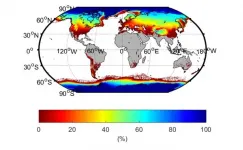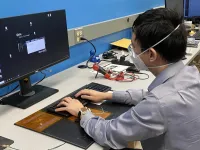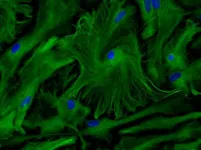(Press-News.org) Researchers at the Francis Crick Institute and University of Dundee have screened thousands of drug and chemical molecules and identified a range of potential antivirals that could be developed into new treatments for COVID-19 or in preparation for future coronavirus outbreaks.
While COVID-19 vaccines are being rolled out, there are still few drug options that can be used to treat patients with the virus, to reduce symptoms and speed up recovery time. These treatments are especially important for groups where the vaccines are less effective, such as some patients with blood cancers.
In a series of seven papers, published today (2 July) in the Biochemical Journal, the scientists identified 15 molecules which inhibit the growth of SARS-CoV-2 by blocking different enzymes involved in its replication.
The researchers developed and ran tests for around 5,000 molecules provided by the Crick's High Throughput Screening team to see if any of these effectively blocked the functioning of any of seven SARS-CoV-2 enzymes. The tests were based on fluorescent changes with a special imaging tool detecting if enzymes had been affected.
They then validated and tested the potential inhibitors against SARS-CoV-2 in the lab, to determine if they effectively slowed viral growth. The team found at least one inhibitor for all seven enzymes.
Three of the molecules identified are existing drugs, used to treat other diseases. Lomeguatrib is used in melanoma and has few side-effects, suramin is a treatment for African sleeping sickness and river blindness and trifluperidol is used in cases of mania and schizophrenia. As there is existing safety data on these drugs, it may be possible to more quickly develop these into SARS-CoV-2 antivirals.
John Diffley, lead author of the papers and associate research director and head of the Chromosome Replication Laboratory at the Crick, said: "We've developed a chemical toolbox of information about potential new COVID-19 drugs. We hope this attracts attention from scientists with the drug development and clinical expertise needed to test these further, and ultimately see if any could become safe and effective treatments for COVID-19 patients."
The 15 molecules were also tested in combination with remdesivir, an antiviral being used to treat patients with COVID-19. Four of these, all which target the SARS-CoV-2 enzyme Nsp14 mRNA Cap methyltransferase, were found to improve the effectiveness of this antiviral in lab tests.
The scientists now plan to run tests to see if any pairing of the 15 molecules they identified decrease the virus' growth more than if they are used alone. Targeting enzymes involved in virus replication could also help prepare for future viral pandemics.
"Proteins on the outside of viruses evolve rapidly but within different classes of viruses are well conserved proteins that change very little with time," adds John.
"If we can develop drugs that inhibit these proteins, in the situation of a future pandemic, they could provide a valuable first line of defence, before vaccines become available."
INFORMATION:
For further information, contact: press@crick.ac.uk or +44 (0)20 3796 5252
Notes to Editors
References:
Basu, S. et al. (2021). Identification of SARS-CoV-2 Antiviral Compounds by Screening for Small Molecule Inhibitors of the nsp14 RNA Cap Methyltransferase. Biochemical Journal. 10.1042/BCJ20210219
Milligan, J. et al. (2021). Identifying SARS-CoV-2 Antiviral Compounds by Screening for Small Molecule Inhibitors of nsp5 Main Protease. Biochemical Journal. 10.1042/BCJ20210197
Bertolin, A. et al. (2021). Identifying SARS-CoV-2 Antiviral Compounds by Screening for Small Molecule Inhibitors of Nsp12/7/8 RNA-dependent RNA Polymerase. Biochemical Journal. 10.1042/BCJ20210200
Zeng, J. et al. (2021). Identifying SARS-CoV-2 Antiviral Compounds by Screening for Small Molecule Inhibitors of Nsp13 Helicase. Biochemical Journal. 10.1042/BCJ20210201
Lim, CT. et al. (2021). Identifying SARS-CoV-2 Antiviral Compounds by Screening for Small Molecule Inhibitors of Nsp3 Papain-like Protease. Biochemical Journal. 10.1042/BCJ20210244
Canal, B. et al. (2021). Identifying SARS-CoV-2 Antiviral Compounds by Screening for Small Molecule Inhibitors of Nsp15 Endoribonuclease. Biochemical Journal. 10.1042/BCJ20210199
Canal, B. et al. (2021). Identifying SARS-CoV-2 Antiviral Compounds by Screening for Small Molecule Inhibitors of Nsp14/nsp10 Exoribonuclease. Biochemical Journal. 10.1042/BCJ20210198
The Francis Crick Institute is a biomedical discovery institute dedicated to understanding the fundamental biology underlying health and disease. Its work is helping to understand why disease develops and to translate discoveries into new ways to prevent, diagnose and treat illnesses such as cancer, heart disease, stroke, infections, and neurodegenerative diseases.
An independent organisation, its founding partners are the Medical Research Council (MRC), Cancer Research UK, Wellcome, UCL (University College London), Imperial College London and King's College London.
The Crick was formed in 2015, and in 2016 it moved into a brand new state-of-the-art building in central London which brings together 1500 scientists and support staff working collaboratively across disciplines, making it the biggest biomedical research facility under a single roof in Europe.
http://crick.ac.uk/
Biochemical Journal. Celebrating 115 years since its first publication, the Biochemical Journal has been at the forefront of biomedical advancement for over a century. Continuing to break new ground in the fields of biochemistry, cellular biosciences, and molecular biology, rigorous understanding of molecular mechanisms in biology remains at the core of its mission. The journal is proud to play a key role in advancing understanding through publication of high-impact research from across the world, leading the way in an era of rapid change and contributing to 21st-century innovation in biochemistry.
Published by Portland Press, the Biochemical Society's wholly-owned publishing arm, the Biochemical Journal forms part of a portfolio of seven journals that return all profits to the life science community in support of the Society's charitable objectives.
Find out more at END
Minority-ethnic medical students must have more role-models in senior leadership positions if they are to engage with academia. This is one of the conclusions drawn by a group of medical students writing in the Journal of the Royal Society of Medicine about the drivers and barriers to engaging with academia.
Barriers currently hampering the chances of minority-ethnic medical students accessing formal pathways into academia, they write, include differential attainment and unconscious bias, difficulties forming meaningful mentor-mentee relationships, as well as the ...
While autistic individuals are less likely to use substances, those who do so are more likely to self-medicate for their mental health symptoms, according to new research from the University of Cambridge and published today in The Lancet Psychiatry.
There is significant debate about substance use of autistic adolescents and adults. Some studies indicate that autistic individuals are less likely to use substances, whereas others suggest that autistic individuals are at greater risk of substance misuse or abuse. The team at the Autism Research Centre in Cambridge used a 'mixed methods' design to consider ...
In an article appearing in Nature Biomedical Engineering, a team of scientists from the UCLA David Geffen School of Medicine and UCLA School of Engineering report real-world results on SwabSeq, a high-throughput testing platform that uses sequencing to test thousands of samples at a time to detect COVID-19. They were able to perform more than 80,000 tests in less than two months, with the test showing extremely high sensitivity and specificity.
SwabSeq uses sample-specific molecular barcodes to simultaneously analyze thousands of samples for the presence or absence of SARS-CoV-2, the virus that causes COVID-19. SwabSeq was granted FDA Emergency Use Authorization in October ...
Cash in on the kids' inheritance and spend up big on the retirement plans - that's the message coming from the University of South Australia as new research reveals that older people are keen to spend their well-earned savings, rather than passing them on to their kids.
And while it may seem like bad news for the younger generation, the research also confirms that the kids are just fine with this scenario, claiming that no one owes anyone anything.
The surprising findings are part of a new study that explores contemporary attitudes towards wealth ...
LA JOLLA, CA--Researchers at La Jolla Institute for Immunology (LJI) have found that T cells from people who have recovered from COVID-19 or received the Moderna or Pfizer-BioNTech vaccines are still able to recognize several concerning SARS-CoV-2 variants.
Their new study, published online on July 1, 2021 in Cell Reports Medicine, shows that both CD4+ "helper" T cells and CD8+ "killer" T cells can still recognize mutated forms of the virus. This reactivity is key to the body's complex immune response to the virus, which allows the body to kill infected cells and stop severe infections.
"This study suggests that the impact of mutations ...
WASHINGTON--The global cryosphere--all of the areas with frozen water on Earth--shrank by about 87,000 square kilometers (about 33,000 square miles), a area about the size of Lake Superior, per year on average, between 1979 and 2016 as a result of climate change, according to a new study. This research is the first to make a global estimate of the surface area of the Earth covered by sea ice, snow cover and frozen ground.
The extent of land covered by frozen water is just as important as its mass because the bright white surface reflects sunlight so effectively, cooling the planet. Changes in the size or location of ice and snow can alter air temperatures, change the sea level and even affect ocean currents worldwide.
The new study is published in Earth's ...
People lived without plastic until the last century or so, but most of us would find it hard to imagine how.
Plastics now are everywhere in our lives, providing low-cost convenience and other benefits in countless applications. They can be shaped to almost any task, from wispy films to squishy children's toys and hard-core components. They have shown themselves vital in medicine and have been pivotal in the global effort to slow the spread of the COVID-19 pandemic over the past 16 months.
Plastics seem indispensable these days.
Unfortunately for the long-term, they are also nearly indestructible. Our planet now bears the weight of more than seven billion tons ...
As smart watches are increasingly able to monitor the vital signs of health, including what's going on when we sleep, a problem has emerged: those wearable, wireless devices are often disconnected from our body overnight, being charged at the bedside.
"Quality of sleep and its patterns contain a lot of important information about patients' health conditions," says Sunghoon Ivan Lee, assistant professor in the University of Massachusetts Amherst College of Information and Computer Sciences and director of the Advanced Human Health Analytics Laboratory.
But that information can't be tracked on smartwatches if the wearable devices are ...
Over years of studying antibody responses against the flu in the Wilson lab at the University of Chicago, researchers kept coming up with a strange finding: antibodies that seemed to bind not only to the flu virus, but to every virus the lab could throw at them. Since antibodies are usually highly specific to individual pathogens, in order to maximize their targeted protective response, this pattern was extremely unusual.
Until finally, they realized: The antibodies weren't responding to the viruses, but rather to something in the biological material in which the viruses had been grown. ...
Astrocytes are cells in the brain which have long been considered only as mere support cells for neurons. In recent years, the study of astrocytes has grown, gradually revealing their importance in brain function. Researchers from Inserm, CNRS and Collège de France at the Center for Interdisciplinary Research in Biology have now uncovered their crucial role in closing the period of brain plasticity that follows birth, finding them to be key to the development of sensory and cognitive faculties. Over the longer term, these findings will make it possible to envisage new strategies for reintroducing brain plasticity in adults, thereby promoting rehabilitation following brain lesions or neurodevelopmental disorders. This research has been published in Science.
Brain plasticity is ...




